Apps
Auto Added by WPeMatico
Auto Added by WPeMatico
You can get access to Uber’s controversial Quiet Ride button that lets you ask your driver for silence if you’ll pay a 20% to 40% premium atop the UberX price. Today the Uber Comfort tier launches in 43 cities and smaller states in the U.S. plus Ottawa, offering those willing to pay the premium access to newer mid-size cars with more legroom, higher-rated drivers and Rider Preferences for requesting specific climate control or no talking.
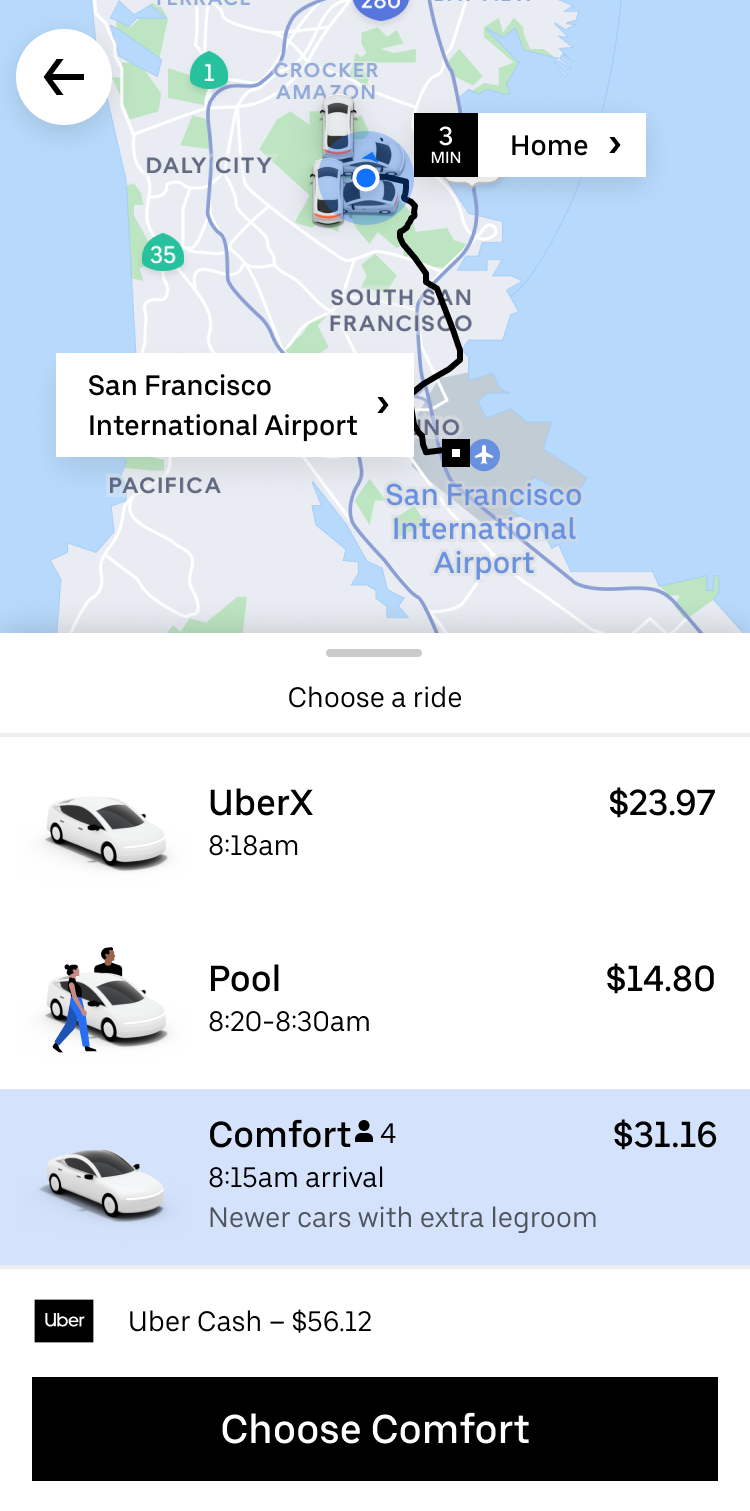 Before users hail an Uber Comfort car, they can request “quiet preferred,” “happy to chat” or leave the default of “no preference,” as well as warmer or colder temperature settings. These Rider Preferences launched in May as part of Uber’s pricier Black and SUV cars alongside a way to request help with luggage, but now they’re becoming more affordable.
Before users hail an Uber Comfort car, they can request “quiet preferred,” “happy to chat” or leave the default of “no preference,” as well as warmer or colder temperature settings. These Rider Preferences launched in May as part of Uber’s pricier Black and SUV cars alongside a way to request help with luggage, but now they’re becoming more affordable.
The move allows Uber to charge more for slightly better vehicles and higher-rated drivers that used to be lumped in with its budget UberX tier. This also lets Uber compensate drivers better if they’re willing to forgo the small talk or crank the air conditioning. “Uber Comfort should result in fares for drivers that are at least 20% higher than UberX (not including surge or promotions) for a trip with the same time and distance,” an Uber spokesperson tells me.
Some critics consider the Quiet Ride button an affront to the dignity of Uber’s contractors, saying it makes them act like robots when their jobs will soon be threatened by self-driving vehicles. But others just see it as enhanced customer service that’s reasonable to request, given riders are paying for a driver’s professional services.
“The reception to Quiet Mode has been generally positive among drivers and riders,” an Uber spokesperson tells me. “Riders appreciate the consistency and control they have over the type of their travel; business travelers in particular have shared how rider preferences have helped them be more productive en route to the airport, important meetings, or other work-related destinations. Drivers have shared how these new rider preferences have helped take the guesswork out of riders’ expectations, and helped them provide the best service possible.” They also noted that Quiet Mode is described in app as a “conversation preference” rather than a firm mandate to be silent.
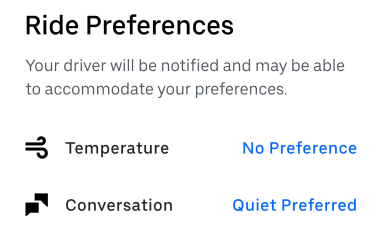
To qualify for Uber Comfort, drivers need a car that meets higher and consistent vehicle make, model, year and legroom requirements, like the Toyota Camry, Honda Odyssey or Chevy Tahoe. They also must maintain a 4.85 or higher rating to be eligible. If these drivers don’t want to receive Rider Preferences requests, they can opt out of being classified as Uber Comfort.
Uber Comfort is now available in San Francisco, Los Angeles, Chicago, Washington, DC, Atlanta, Austin, Baltimore, Boston, Charleston, Charlotte, Dallas, Fresno, Hampton Roads, Houston, Honolulu, Indianapolis, Kansas City, Las Vegas, Madison, Memphis, Milwaukee, Nashville, New Orleans, Omaha, Orange County, Palm Springs, Phoenix, Pittsburgh, Portland, Raleigh-Durham, Richmond, Sacramento, Salt Lake City, San Antonio, San Diego, Seattle, St. Louis, Tampa Bay, Tucson and Wichita, plus Ottawa, Canada, as well as the full states of Connecticut, New Jersey and Rhode Island.
Here’s the breakdown of Uber’s tiers from cheapest to most expensive:
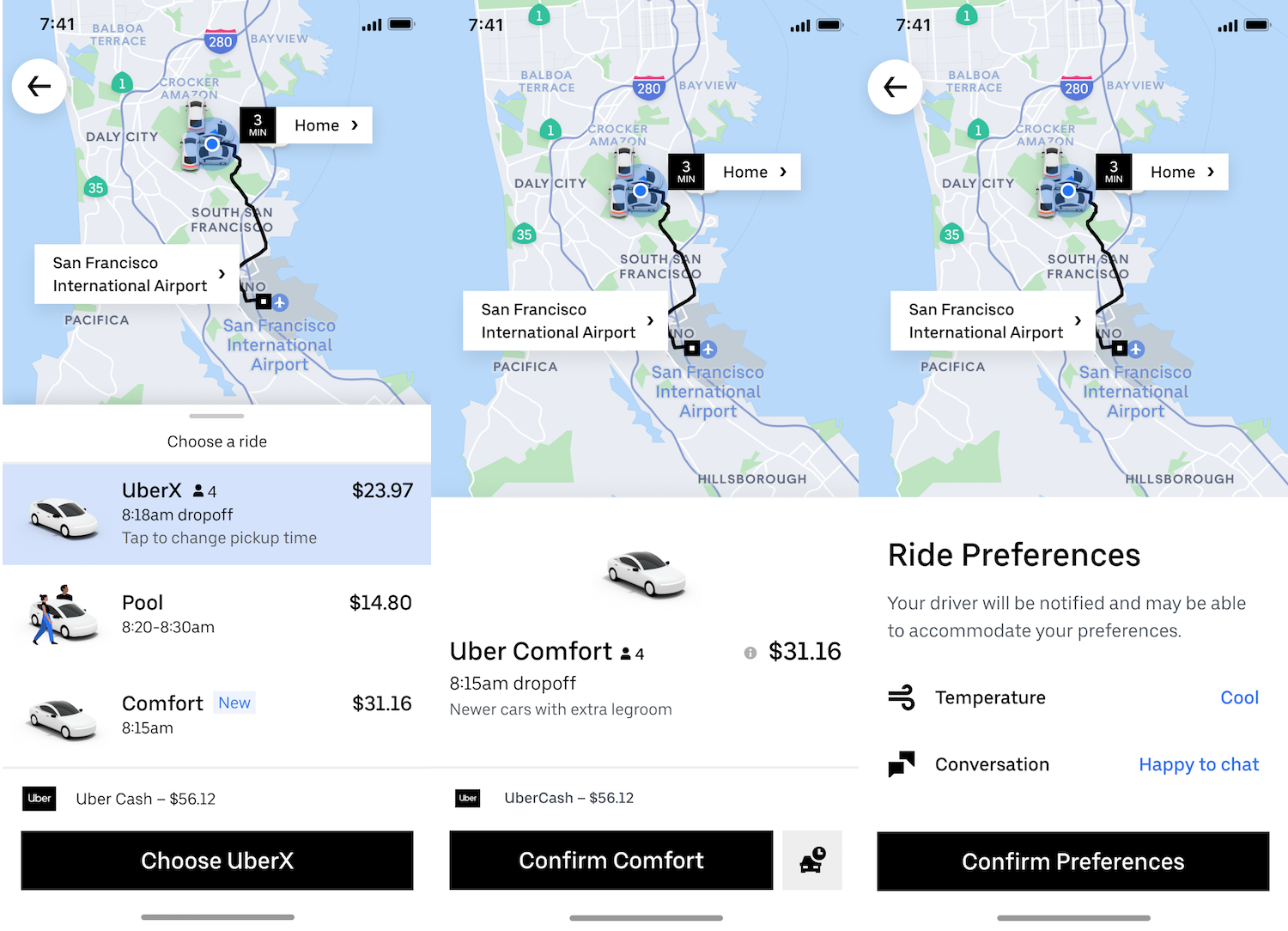
Back in December, I recommended Uber add a Quiet Ride option that can be nice if you’re trying to work or rest during your trip. Users told me it was awkward having to ask drivers mid-ride for quiet, as some would become offended or even hostile.
That’s especially problematic for women, some who said their male drivers’ probing questions would escalate to unwanted flirtation. Uber needs to do better at training drivers that this is unacceptable and weed them out of the system. But the reactive approach of waiting for negative ratings to come in after drivers have annoyed passengers can be augmented by allowing riders to ask for quiet ahead of time.
Bringing Rider Preferences to a wider swath of its vehicles could help Uber differentiate itself from competitors like Lyft and squeeze more cash out of passengers by training them to use its upgraded tiers as it tries to maintain momentum in the public market. Two months after its IPO, it’s finally recovered and exceeded its opening price.
Powered by WPeMatico
NiYO Solutions, a Bangalore-based “neo-bank” that helps salaried employees and blue-collar workers access company benefits and other financial services, has raised $35 million in a new funding round to expand its business in the nation and explore international markets for some of its products.
The four-year-old startup, which serves small and medium businesses and other salaried employees across India, raised its Series B from Horizons Ventures, Tencent and existing investor JS Capital. It has raised $49.2 million to date, with its $13.2 million Series A closing in January last year.
NiYO Solutions serves as a “neo-bank” that relies on traditional financial institutions (Yes Bank and DCB banks, in its case) and offers to customers additional features such as lending and insurance. Blue-collared employees in India (and many other markets) continue to struggle in availing crucial financial services from banks that typically reserve them for the privileged segment. With its payroll solution and other products, NiYO is trying to drive financial inclusion in the country, it said.
The startup also offers a global travel card with no mark-up fee. More than 50,000 users have already signed up for the travel card — and NiYO intends to scale that figure to 500,000 by April next year. In an interview with TechCrunch, Vinay Bagri, co-founder and CEO of NiYO, said the startup is exploring bringing the travel card to other markets — though he did not share any names.
He said the startup will also use the fresh capital to build new product offerings and in expansion of its distribution and marketing efforts. It also wants to grow its customer base from about 1 million currently to 5 million in the next three years. Bagri said NiYO is looking to acquire other startups that are a good fit for its vision.
Neo banks are increasingly becoming popular across the globe as traditional banks show little interest in addressing the needs of niche customer bases. Tide and N26 are showing remarkable growth in European markets, while Azlo in the U.S. and Tyro Payments and Volt Bank in Australia are also among the top players.
In developing regions such as India, too, this tried and tested idea is increasingly being replicated. Open, another Bangalore-based neo-bank, helps businesses automate their finances. It raised $30 million last month.
Powered by WPeMatico
India ordered an investigation into Google’s alleged abuse of Android’s dominance in the country to hurt local rivals. A document made public by the local antitrust watchdog has now further revealed the nature of the allegations and identified the people who filed the complaint.
Umar Javeed and Sukarma Thapar, two associates at Competition Commission of India — and Aaqib Javeed, brother of Umar and who interned at the watchdog last year, filed the complaint, the document revealed. The revelation puts an end to months-long interest from industry executives, many of whom wondered if a major corporation was behind it.
The case, filed against Google’s global unit and Indian arm on April 16 this year, makes several allegations, including the possibility that Google used Android’s dominant position in India to hurt local companies. The accusation is that Google requires handset and tablet vendors to pre-install its own applications or services if they wish to get the full-blown version of Android . Google’s Android mobile operating system powered more than 98% of smartphones that shipped in the country last year, research firm Counterpoint said.
This accusation is partly true, if at all. To be sure, Google does offer a “bare Android” version, which a smartphone vendor could use and then they wouldn’t need to pre-install Google Mobile Services (GMS). Though by doing so, they will also lose access to Google Play Store, which is the largest app store in the Android ecosystem. Additionally, phone vendors do partner with other companies to pre-install their applications. In India itself, most Android phones sold by Amazon India and Flipkart include a suite of their apps preloaded on the them.
“OEMs can offer Android devices without preinstalling any Google apps. If OEMs choose to preinstall Google mobile apps, the MADA (Mobile Application Distribution Agreement) allows OEMs to preinstall a suite of Google mobile apps and services referred to as Google Mobile Services (GMS),” said Google in response.
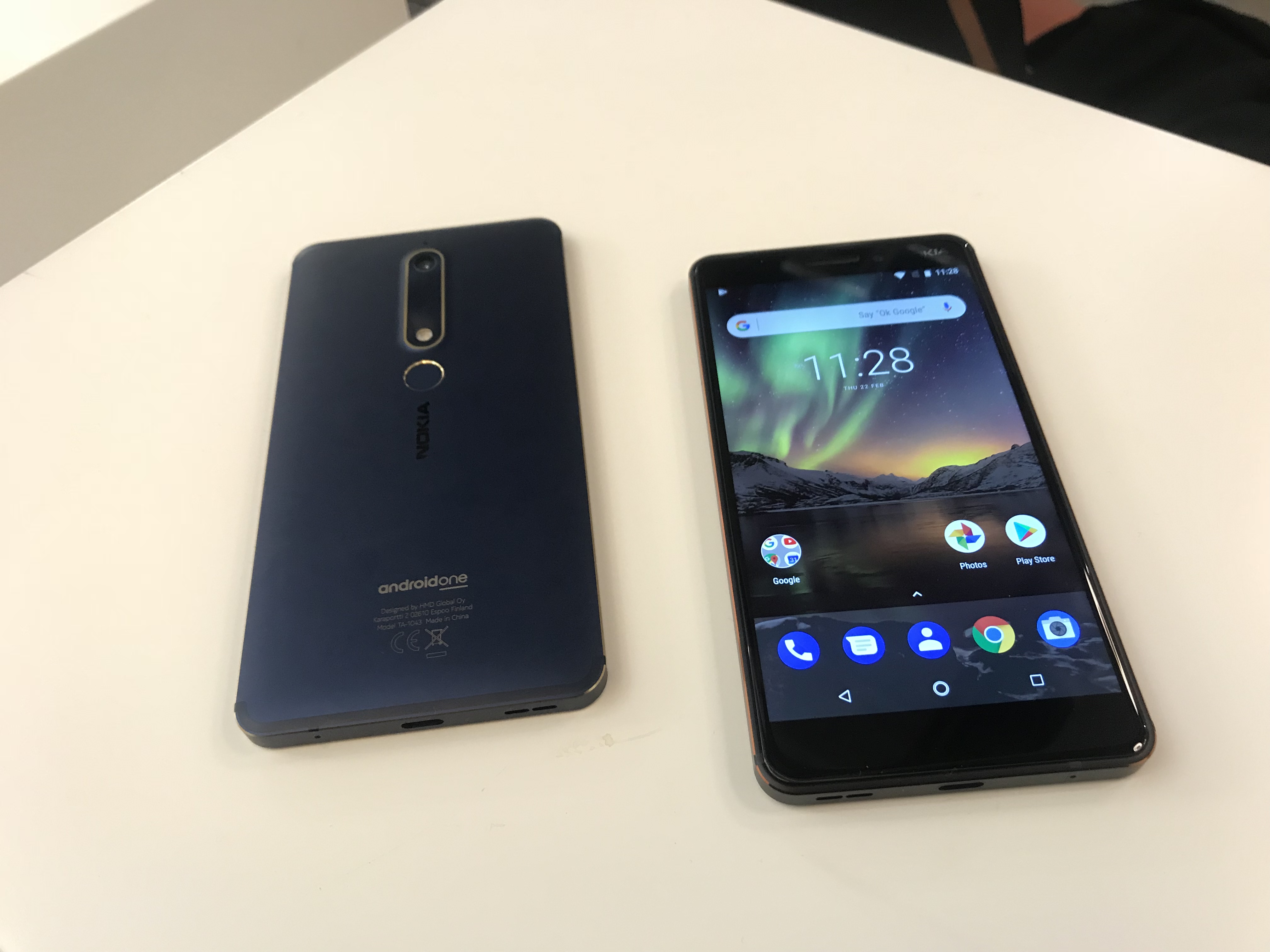
The second allegation is that Google is bundling its apps and services in a way that they are able to talk to each other. “This conduct illegally prevented the development and market access of rival applications and services in violation of Section 4 read with Section 32 of the Act,” the trio wrote.
This also does not seem accurate. Very much every Android app is capable of talking to one another through APIs. Additionally, defunct software firm Cyanogen partnered with Microsoft to “deeply integrate” Cortana into its Android phones — replacing Google Assistant as the default virtual voice assistant. So it is unclear what advantage Google has here.
Google’s response: “This preinstallation obligation is limited in scope. It was pointed out that preinstalled Google app icons take up very little screen space. OEMs can and do use the remaining space to preinstall and promote both their own, and third-party apps. It was also submitted that the MADA preinstallation conditions are not exclusive. Nor are they exclusionary. The MADA leaves OEMs free to preinstall rival apps and offer them the same or even superior placement.”
The third accusation is that Google prevents smartphone and tablet manufacturers in India from developing and marketing modified and potentially competing versions of Android on other devices.
This is also arguably incorrect. Micromax, which once held tentpole position among smartphone vendors in India, partnered with Cyanogen in their heyday to launch and market Android smartphones running a customized operating system. Chinese smartphone vendor OnePlus followed the same path briefly.
Google’s response: “Android users have considerable freedom to customise their phones and to install apps that compete with Google’s. Consumers can quickly and easily move or disable preinstalled apps, including Google’s apps. Disabling an app makes it disappear from the device screen, prevents it from running, and frees up device memory – while still allowing the user to restore the app at a later time or to factory reset the device to its original state.”
Additionally, Google says it requires OEMs to “adhere to a minimum baseline compatibility standard” for Android called Compatibility Definition Document (COD) to ensure that apps written for Android run on their phones. Otherwise, this risks creating a “threat to the viability and quality of the platform.”
“If companies make changes to the Android source code that create incompatibilities, apps written for Android will not run on these incompatible variants. As a result, fewer developers will write apps for Android, threatening to make Android less attractive to users and, in turn, even fewer developers will support Android,” the company said.
The antitrust is ongoing, but based on an initial probe of the case, CCI has found that Google has “reduced the ability and incentive of device manufacturers to develop and sell devices” running Android forks, the watchdog said. Google’s condition to include “the entire GMS suite” to devices from OEMs that have opted for full-blown a version of Android, amounts to “imposition of unfair condition on the device manufacturers,” the watchdog added.
The document also reveals that Google has provided CCI with some additional responses that have been kept confidential. A Google spokesperson declined to comment.
Powered by WPeMatico
HQ Trivia’s troubles continue after a failed mutiny to oust the CEO, a 92% decline in downloads since versus a year ago, and layoffs of 20% of its staff last week. Now TechCrunch has learned HQ has failed to install a new CEO after months of searching. Meanwhile, users continue to complain about delays for payouts of their prizes from the live mobile trivia game, and about being booted from the game for no reason while on the final question.
Notably, Jeopardy winner Alex Jacob claims he hasn’t been paid the $20,000 he won on HQ Trivia on June 10th. This could shake players faith in HQ and erode their incentive to compete.
Guys, I need your help. I won $20,000 on @hqtrivia on June 10 and still haven’t heard anything about payment. Sadly, I don’t think they’re going to pay.
Please RT to tell HQ they should honor their jackpots. If I’m wrong, I’ll happily delete this & give $100 to someone who RT’d! pic.twitter.com/FmpY6unK49
— Alex Jacob (@whoisalexjacob) July 8, 2019
An HQ Trivia representative tells TechCrunch that the game has paid out $6.25 million to date and that 99% of players have been eligible to cash out within 48 hours of winning, but some winners may have to wait up to 90 days for it to ensure they didn’t break the rules to win. Given Jacob’s large jackpot, it’s possible the delay could be due to the company investigating to ensure he won fairly, though he’s clearly skilled at trivia given he won Jeopardy’s Tournament Of Champions in 2015. Jacob did not respond to requests for interview.
“We strive to make a game that is fair and fun for all players. As such, we have a rigorous process of reviewing winners for eligibility to receive cash prizes. Infrequently, we disqualify players for violating HQ‘s Terms of Service and Contest Rules” HQ Trivia’s press alias anonymously reponded to our request for comment. “It may take some eligible winners up to 90 days to receive cash prizes, however 99% of players have been able to cash out within 48 hours of winning a game and we have paid out a total of $6,252,634.58 USD to winners since launch.”
It seems that HQ’s internal problems are now metastasizing into public issues. Its team being short-staffed and distracted by weak morale could lengthen payout delays, which make players worry if they’ll ever get their cash. When they share those sentiments to social media, it could discourage others from playing. That, combined with concerns that bots and cheaters are winning the games, splitting the jackpots into tiny fractions so legitimate winners get less, has hurt the perception of HQ as a game where the smartest can win big.
Back in April, TechCrunch reported that 20 of HQ’s 35 staffers were preparing a petition to the board to remove CEO and co-founder Rus Yusupov for mismanagement. Yusupov caught wind of the plot and fired two of the leaders of the movement. However, HQ’s board decided it would bring in a new CEO. Board member and Tinder CEO Elie Seidman told TechCrunch that Yusupov had accepted he would be replaced by someone with the ability fire him and that a CEO search was ongoing. The startup’s lead investor Lightspeed has pledged to provide 18 months of funding once a new CEO was hired.
However, multiple sources tell TechCrunch that a new CEO has yet to be installed. One source tells me that management had promised a new CEO by the beginning of August, but that Yusupov had stalled the process seemingly to remain in power. HQ Trivia, Yusupov, and Seidman did not respond for requests for comment regarding the CEO search.
When asked about morale at the company, a source familiar with HQ’s internal situation told me “It’s terrible.” Yusupov is said to continue to be tough to work with, making decisions without full buy-in from the rest of the company. A substantial portion of the team was allegedly unaware of plans to launch a $9.99 subscription tier for HQ’s second game HQ Words until the company tweeted out the announcement.
Hopefully HQ Trivia can find a new captain to steer this ship back into smoother waters. The game has hundreds of thousands of players and many more with fond memories of competing. There’s still hope if it can evolve the product to give new users a taste of gameplay without waiting for the next scheduled match, find new revenue in expanded brand partnerships, fight off the bots and cheaters, and get everyone paid promptly. Perhaps there’s room for television tie-ins to bring HQ to a wider audience.
But before the startup can keep quizzing the world, HQ Trivia must endure its internal tests of resolve and find a champ to lead it.

Powered by WPeMatico
Instagram announced two new features today that it said are designed to combat online bullying.
In both cases, the Facebook -owned service seems to be trying to find ways to limit bad behavior without outright blocking posts or banning users.
“We can do more to prevent bullying from happening on Instagram, and we can do more to empower the targets of bullying to stand up for themselves,” wrote Instagram head Adam Mosseri in the announcement. “Today we’re announcing one new feature in both areas. These tools are grounded in a deep understanding of how people bully each other and how they respond to bullying on Instagram, but they’re only two steps on a longer path.”
The first feature is supposed to use artificial intelligence to flag comments that “may be considered offensive.” In those cases, users are asked, “Are you sure you want to post this?” and then given the option button to “undo” their comment before it posts.
This might seem like a relatively tame response, particularly because users can still go ahead and post the original comment if they want, but Mosseri said that in early tests, his team found that the prompt “encourages some people to undo their comment and share something less hurtful once they have had a chance to reflect.”
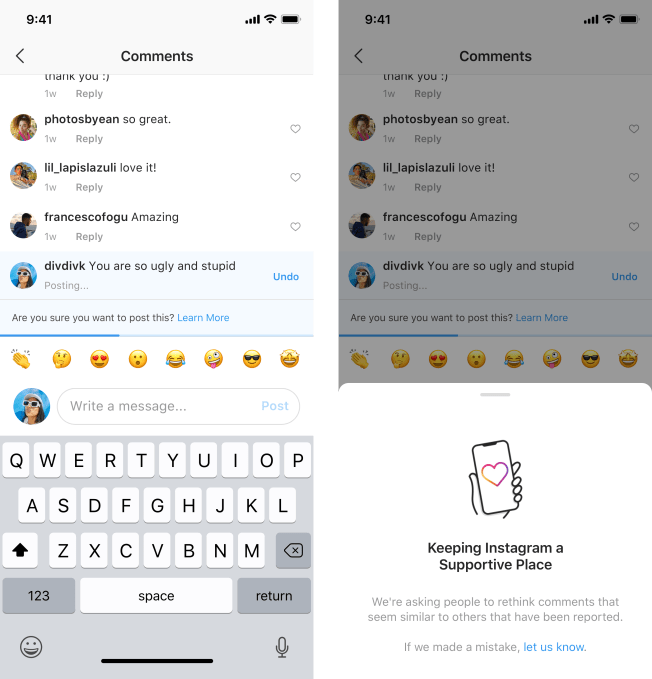
The other addition, which Mosseri said the service will start testing soon, is the ability to “restrict” users looking at your account.
“We’ve heard from young people in our community that they’re reluctant to block, unfollow, or report their bully because it could escalate the situation, especially if they interact with their bully in real life,” Mosseri wrote.
So by using this new option, you can limit another user’s interaction with your account without making it obvious. If you restrict someone, their comments on your posts will only be visible to them, unless you approve a comment for general consumption. They also won’t be able to see if you’re active on Instagram or if you’ve read their direct messages.
Mosseri described earlier versions of these features at Facebook’s F8 developer conference in April.
Powered by WPeMatico
French startup Karamel wants to help you find things to do for your kids. The company is launching a mobile app that lets you find and book kid-friendly activities around you.
The startup also just raised a $560,000 round (€500,000) from Kima Ventures, Roxanne Varza, Thibaud Elzière and Oleg Tscheltzoff. Varza participates in the Atomico Angel Programme, which means that Atomico handed out $100,000 to invest in multiple early-stage companies. Atomico and Varza both see returns if the company eventually succeeds.
Karamel wants to become a one-stop shop for things your kids can do. When you open the app, you get a curated selection of activities around you so that you can find something to do this weekend, for instance.
If you’re looking for something specific, you can search for activities based on multiple criteria, such as the age of your child, an activity category, price, distance and day of the week.
You also can find recurring activities in case your child really wants to learn a new instrument or start a new sport, for instance.
On the other side of the marketplace, there are many different organizations in charge of activities. It’s a fragmented market, and those organizations don’t always know how to reach parents efficiently.
Thanks to Karamel, those organizations should get more traffic and could focus more on activities themselves. The startup doesn’t charge any monthly subscription fee. Instead, Karamel is taking a cut on transactions. Parents pay the same price if they book directly or though Karamel.
The service is currently live in Paris. And if you live in Marseille, Lyon, Bordeaux or Montpellier, you can search for activities but can’t book through the app just yet.
In the U.S., KidPass provides something vaguely similar, but with a monthly subscription fee. KidPass opted for a credit-based system like Audible or ClassPass.
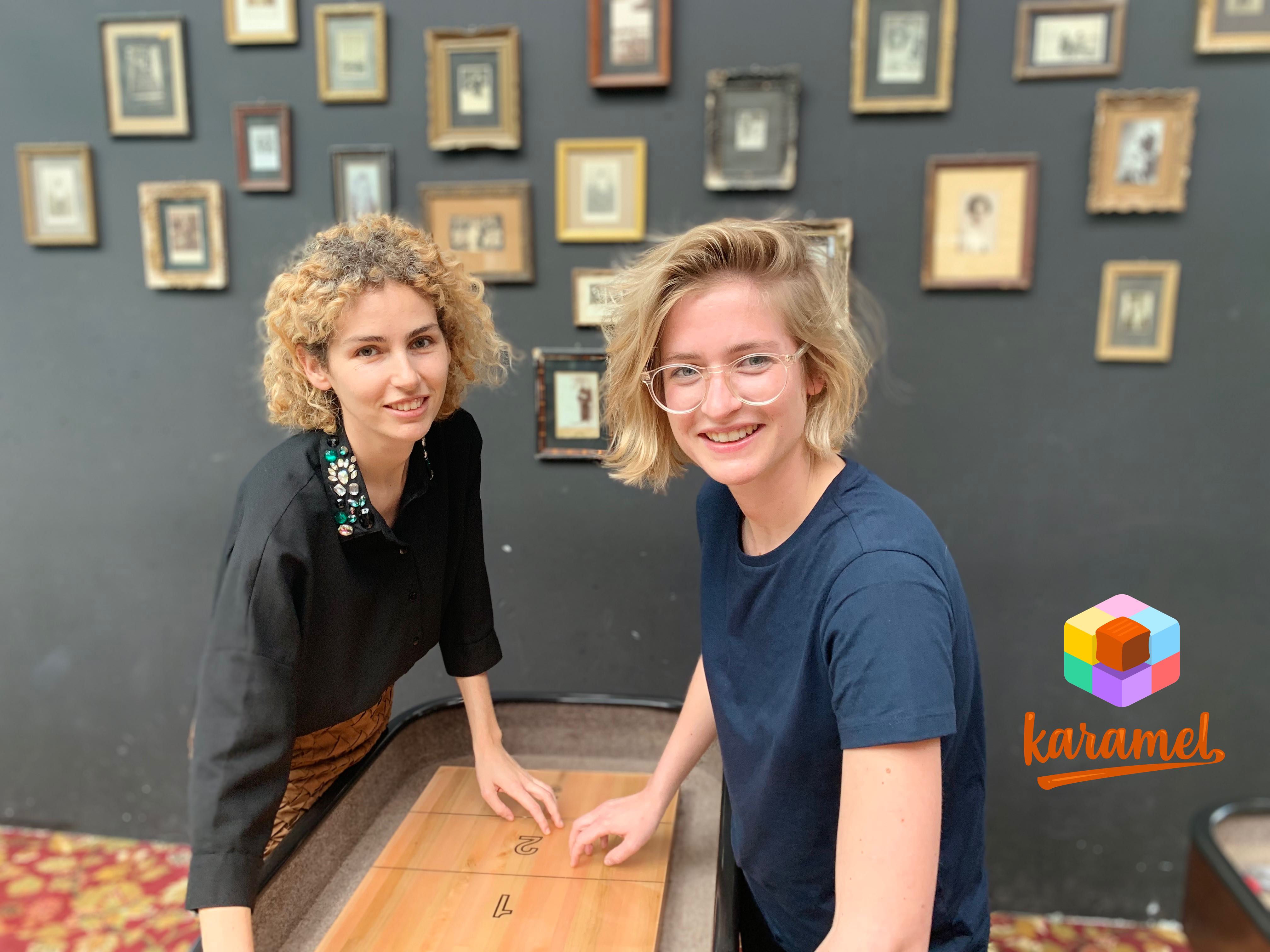
Powered by WPeMatico
Alphabet-backed UnitedMasters, the music label distribution startup and record label alternative that offers artists 100 percent ownership of everything they create, launched its iPhone app today.
The iPhone app works like the service they used to offer only via the web, giving artists the chance to upload their own tracks (from iCloud, Dropbox or directly from text messages), then distribute them to a full range of streaming music platforms, including Spotify, Apple Music, Tidal and more. In exchange for this distribution, as well as analytics on how your music is performing, UnitedMasters takes a 10% share on revenue generated by tracks it distributes, but artists retain full ownership of the content they create.
UnitedMasters also works with brand partners, including Bose, the NBA and AT&T, to place tracks in marketing use across the brand’s properties and distributed content. Music creators are paid out via PayPal once they connect their accounts, and they can also tie-in their social accounts for connecting their overall online presence with their music.
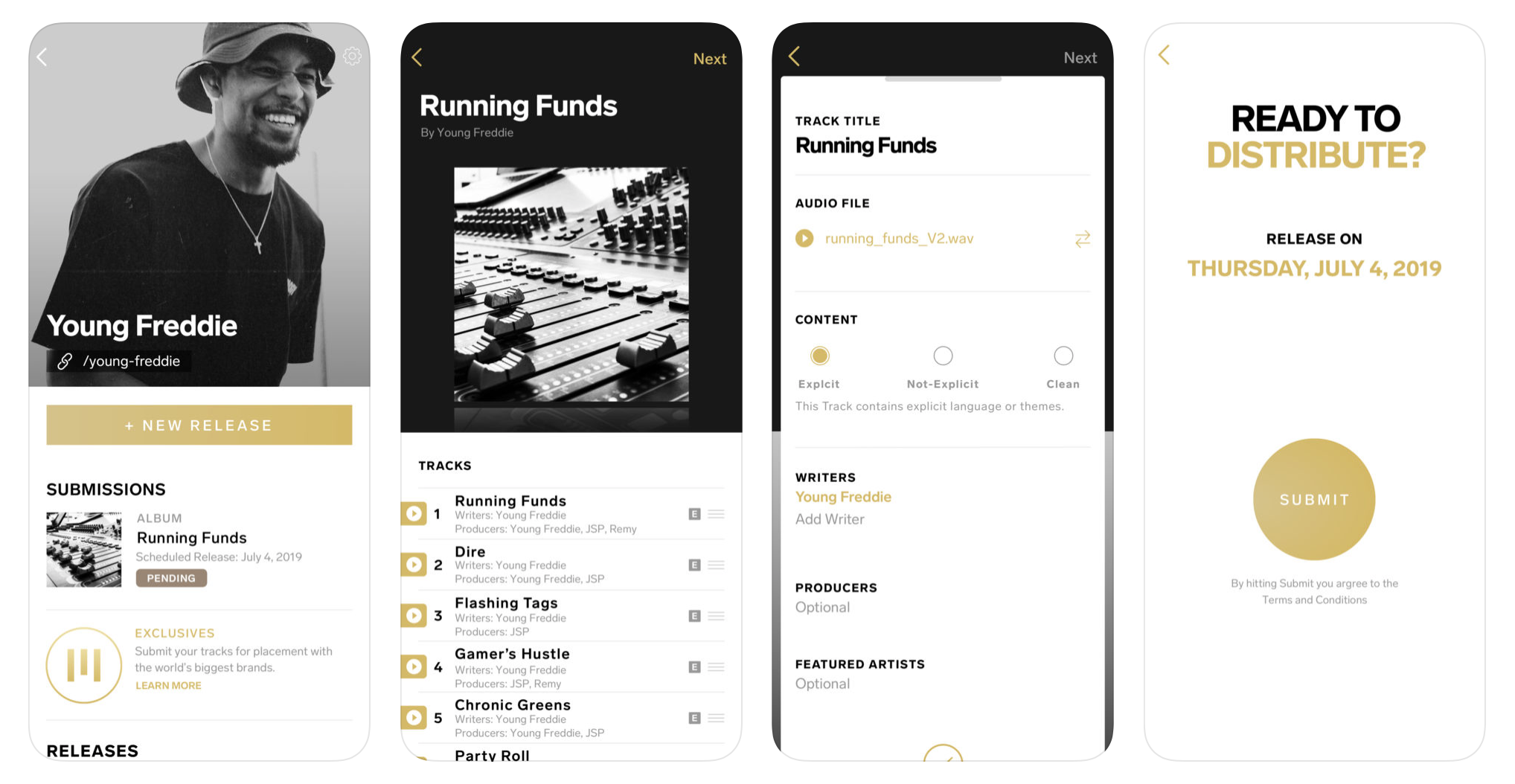
Using the app, artists can create entire releases by uploading not only music tracks but also high-quality cover art, and by entering information like whether any producers participated in the music creation, and whether the tracks contain any explicit lyrics. You can also specific an exact desired release date, and UnitedMasters will do its best to distribute across services on that day, pending content approvals.
UnitedMasters was founded by former Interscope Records president Steve Stoute, and also has funding from Andreessen Horwitz and 20th Century Fox. It’s aiming to serve a new generation of artists who are disenfranchised by the traditional label model, but seeking distribution through the services where listeners actually spend their time, and using the iPhone as manage the entire process definitely fits with serving that customer base.
Powered by WPeMatico
HQ Trivia is struggling after a mutiny failed to oust its CEO. Downloads per month are down 92% versus last June according to Sensor Tower. And now four sources confirm that HQ laid off staff members this week. One said about 20% of staff was let go, and another said six to seven employees were departing. That aligns with Digiday reporter Kerry Flynn’s tweet that 7 employees were let go bringing HQ to under 30 (shrinking from 35 to 28 staffers would be a 20% drop).
That will leave the company short-handed as it attempts to diversify revenue with the upcoming launch of monthly subscriptions. “HQ Words Everyday. Coming next month . . . Bigger prizes . . . More ways to win. $9.99/mo. subscription” the company tweeted from the account for its second game, the Wheel Of Fortune-style HQ Words. The company has been trying to regain momentum with new hosts since the departure of Quiz Daddy aka Scott Rogowsky, HQ Trivia’s original host.
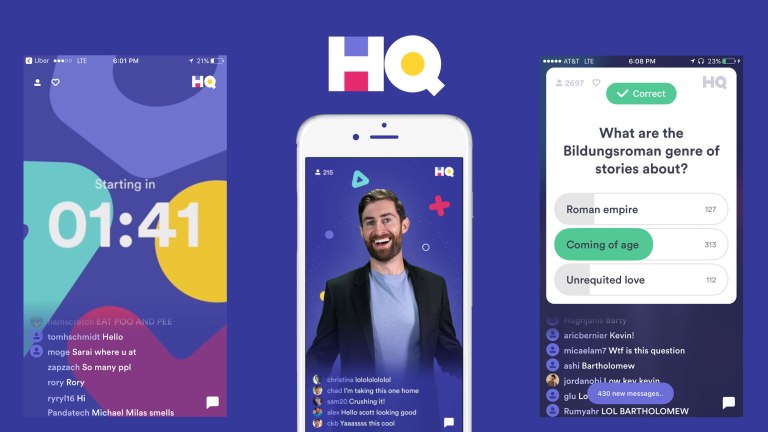
The cuts hit HQ’s HR, marketing, and product engineering teams, according to LinkedIn profiles of employees let go. The cuts could further hamper morale at the startup following a tough first half of the year. HQ Trivia and co-founder Rus Yusupov did not respond to repeated requests for comment.

HQ Trivia employees petitioned to remove co-founder Rus Yusupov from the CEO position
Following the tragic death of co-founder and CEO Colin Kroll, Yusupov retook control. But staff found him difficult to work with as he’d allowed the product to stagnate and popularity to decline. Yusupov was slow to make changes to the app, and “no one wanted to work under Rus” a source told me.
That led 20 of 35 staffers to sign a letter to HQ Trivia’s board asking them to remove Yusupov, though it was never formally sent. Yusupov caught wind of the plot and fired two of the leaders of the petition. That further sunk morale, leading to the exit of HQ Trivia’s SVP of brand partnerships and its marketing manager. The board began a search for a new CEO, though it’s unclear how that’s panned out.
Since then, new games HQ teased in April haven’t materialized as its download rate continued to suffer. It’s dropped to the #731 US game on iOS according to AppAnnie. HQ Trivia saw just 827,000 downloads from January through June 2019, down 92% from the 10.2 million it saw in the same time frame in 2018 according to Sensor Tower. That’s the same percentage drop in downloads from June 2019 versus June 2018, indicating Rogowsky’s replacements that started in April couldn’t turn things around.
Interest in the live game show format seems to be waning as a whole. HQ Trivia fan site HQTrivia.fan shut down this week fearing the end was near for the official game, and the (Business) INSIDER-run clone of the game on Facebook Watch called Confetti stopped airing at the end of June.
HQ Words Everyday. Coming next month.
Play HQ Words every day.
Bigger prizes.
More ways to win.
$9.99/mo. subscription.
RT and reply with your username for a chance to win a free year. #wordseveryday
— HQ Words (@hqwords) June 26, 2019
Rather than solely monetizing a waning audience via in-app purchases and sponsorships, HQ Words announced it would debut a $9.99 monthly subscription sometime this month that would grant access to winning “bigger prizes”. This could be a smart way to squeeze more dollars out of a smaller but more diehard audience.
While HQ Trivia was an inspiring approach to mobile gaming, its twice-daily games didn’t fit the always-on nature of mobile. It’s failed build a proper onboarding experience that gives users a taste of it games right away rather than forcing them to wait for the next scheduled match as we suggested over a year ago. Gamers are fickle, craving instant gratification, and HQ hasn’t tried to meet them in middle.
Perhaps there’s a future for HQ on cable television, or as a small but steady business on mobile catering to loyalists. But all the unfortunate events and mismanagement may make it difficult to exceed the $100 million valuation it raised money at during its peak.
Powered by WPeMatico
Superhuman, the buzzy and currently invite-only email startup that you might have come across even if you yourself don’t have access if you’ve ever encountered a “Sent via Superhuman” email signature, is making some changes based on community feedback. These include removing location logging altogether, getting rid of all existing location data and turning off read receipts by default and making them an opt-in feature for users.
The email app’s default email tracking behavior (embedding the commonly used advertising tool of a “pixel” in emails to report back to senders info like whether an email’s been opened or not) raised a number of concerns, centered around this blog post by former Twitter design executive Mike Davidson. Davidson’s post generated a lot of community response, and now Superhuman founder Rahul Vohra has issued a response to that response, including a list of actions that his company is taking to address concerns. Specifically, Superhuman’s product changes are focused around mitigating the potential for abuse of sharing location data – which could be very dangerous in the hands of a sender with ill intent for their recipient.
These include immediately stopping any location logging for any emails sent by the service, and also rolling out new versions of the app that don’t show location data in the interface. All existing logged location data will also be deleted so it’s not even discoverable through means other than the UI, Vohra says in a blog post detailing the changes.
Superhuman won’t be getting rid of its “read status” feature entirely however — it’ll still provide info to Superhuman users about whether or not an email was opened. This feature will be turned off by default, however, so it’s on users to activate it. Note that that still doesn’t change anything for recipients of Superhuman emails with read receipts turned on — they don’t get an option to consent to sending read receipts. Finally, Superhuman will enable disabling of remote image loading, which is itself a way to block incoming tracking pixels.
Vohra said on Twitter the reason Superhuman hasn’t issued a response to this previously, despite a few days of heated conversation about their company, is that the startup was considering how best to address the concerns. As Matthew noted in an article Tuesday on the subject, this is actually how discussion and debate should work.
Powered by WPeMatico
App store spending is continuing to grow, although not as quickly as in years past. According to a new report from Sensor Tower, the iOS App Store and Google Play combined brought in $39.7 billion in worldwide app revenue in the first half of 2019 — that’s up 15.4% over the $34.4 billion seen during the first half of last year. However, at that time, the $34.4 billion was a 27.8% increase from 2017’s numbers, then a combined $26.9 billion across both stores.
Apple’s App Store continues to massively outpace Google Play on consumer spending, the report also found.
In the first half of 2019, global consumers spent $25.5 billion on the iOS App Store, up 13.2% year-over-year from the $22.6 billion spent in the first half of 2018. Last year, the growth in consumer spending was 26.8%, for comparison’s sake.
Still, Apple’s estimated $25.5 billion in the first half of 2019 is 80% higher than Google Play’s estimated gross revenue of $14.2 billion — the latter a 19.6% increase from the first half of 2018.
The major factor in the slowing growth is iOS in China, which contributed to the slowdown in total growth. However, Sensor Tower expects to see China returning to positive growth over the next 12 months, we’re told.
To a smaller extent, the downturn could be attributed to changes with one of the top-earning apps across both app stores: Netflix.
Last year, Netflix dropped in-app subscription sign-ups for Android users. Then, at the end of December 2018, it did so for iOS users, too. That doesn’t immediately drop its revenue to zero, of course — it will continue to generate revenue from existing subscribers. But the number will decline, especially as Netflix expands globally without an in-app purchase option, and as lapsed subscribers return to renew online with Netflix directly.
In the first half of 2019, Netflix was the second highest earning non-game app with consumer spending of $339 million, Sensor Tower estimates, down from $459 million in the first half of 2018. (We should point out the firm bases its estimates on a 70/30 split between Netflix and Apple’s App Store that drops to 85/15 after the first year. To account for the mix of old and new subscribers, Sensor Tower factors in a 25% cut. But Daring Fireball’s John Gruber claims Netflix had a special relationship with Apple where it had an 85/15 cut from year one.)
In any event, Netflix’s contribution to the app stores’ revenue is on the decline.
In the first half of last year, Netflix had been the No. 1 non-game app for revenue. This year, that spot went to Tinder, which pulled in an estimated $497 million across the iOS App Store and Google Play, combined. That’s up 32% over the first half of 2018.

But Tinder’s dominance could be a trend that doesn’t last.
According to recent data from eMarketer, dating app audiences have been growing slower than expected, causing the analyst firm to revise its user estimates downward. It now expects that 25.1 million U.S. adults will use a dating app monthly this year, down from its previous forecast of 25.4 million. It also expects that only 21% of U.S. single adults will use a dating app at all in 2019, and that will only grow to 23% by 2023.
That means Tinder’s time at the top could be overrun by newcomers in later months, especially as new streaming services get off the ground (assuming they offer in-app subscriptions); if TikTok starts taking monetization seriously; or if any other large apps from China find global audiences outside of China’s third-party app stores.
For example, Tencent Video grossed $278 million globally in the first half of 2019, outside of the third-party Chinese Android app stores. That made it the third-largest non-game app by revenue. And Chinese video platform iQIYI and YouTube were the No. 4 and No. 5 top-grossing apps, respectively.
Meanwhile, iOS app installs actually declined in the first half of the year, following the first quarter that saw a decline in downloads, Q1 2019, attributed to the downturn in China.
The App Store in the first half of 2019 accounted for 14.8 billion of the total 56.7 billion app installs.
Google Play installs in the first half of the year grew 16.4% to 41.9 billion, or about 2.8 times greater than the iOS volume.
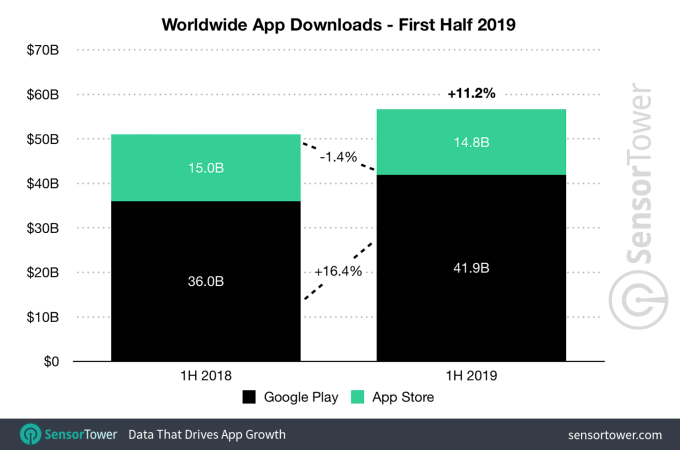
The most downloaded apps in the first half of 2019 were the same as before: WhatsApp, Messenger and Facebook led the top charts. But TikTok inched ahead of Instagram for the No. 4 spot, and it saw its installs grow around 28% to nearly 344 million worldwide.
In terms of mobile gaming specifically, spending was up 11.3% year-over-year in the first half of 2019, reaching $29.6 billion across the iOS App Store and Google Play. Thanks to the fallout of the game licensing freeze in China, App Store revenue growth for games was at $17.6 billion, or 7.8% year-over-year growth. Google Play game spending grew by 16.8% to $12 billion.
The top-grossing games, in order, were Tencent’s Honor of Kings, Fate/Grand Order, Monster Strike, Candy Crush Saga and PUBG Mobile.
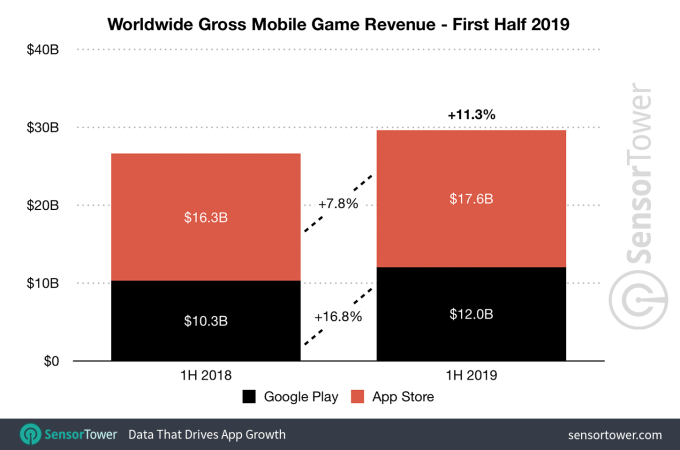
Meanwhile, the most downloaded games were Color Bump 3D, Garena Free Fire and PUBG Mobile.
Image credits: Sensor Tower
Powered by WPeMatico